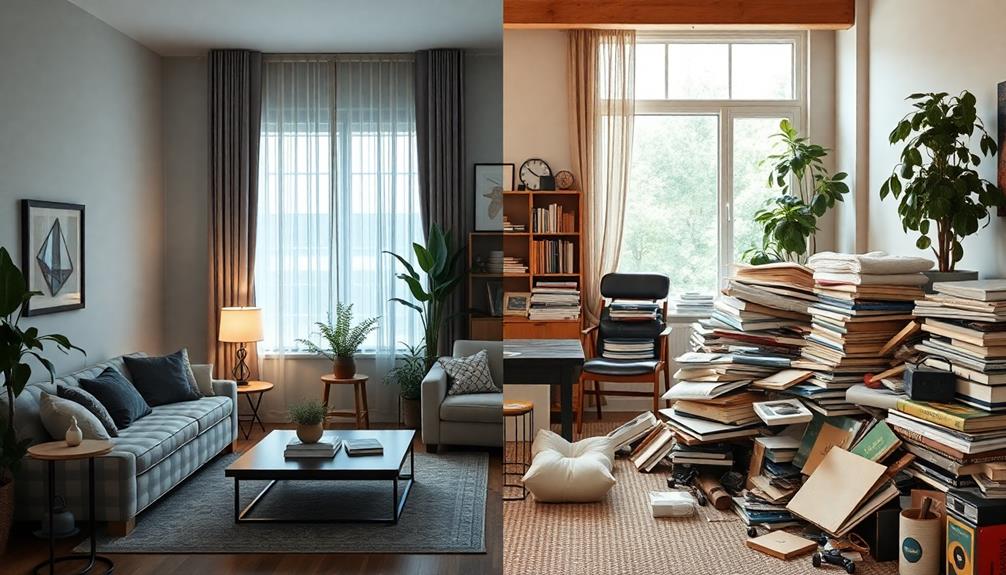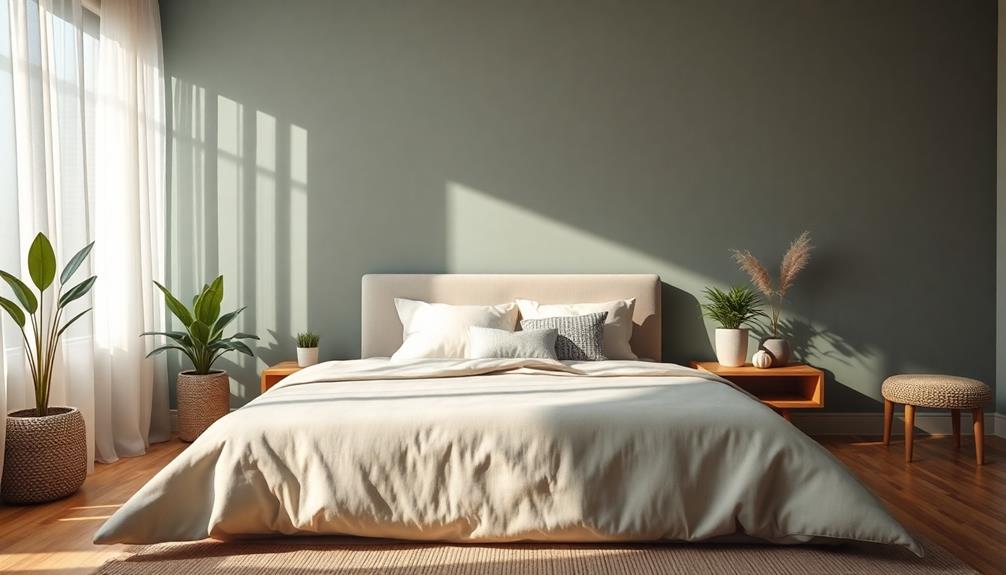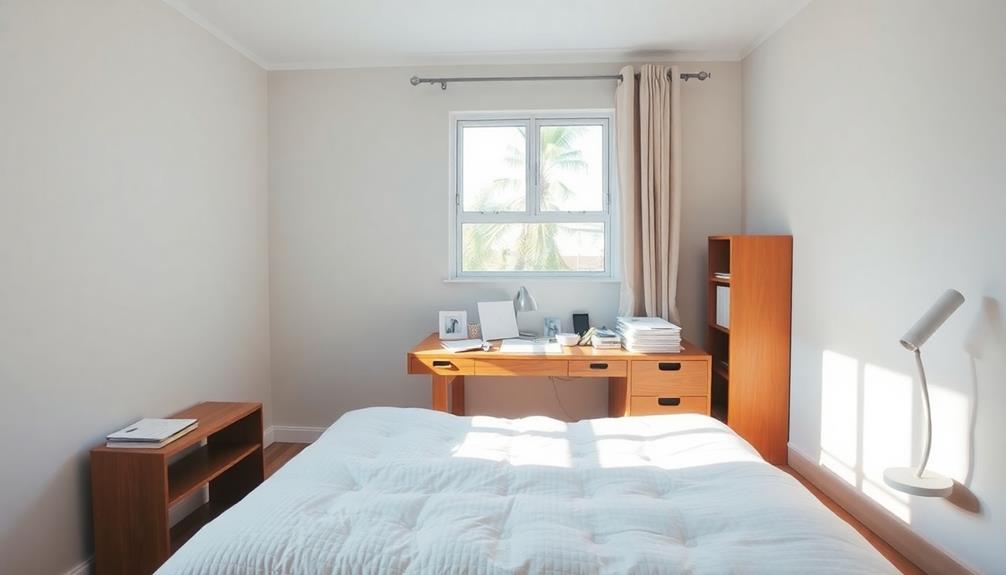You may be overlooking three crucial Feng Shui errors that disrupt the energy flow in your home. The first mistake is having clutter, which can impede the flow of positive energy, leading to stress and confusion. It is important to declutter regularly to create a more peaceful environment. Secondly, the placement of your bed is significant; it should be positioned in a way that allows you to easily see the door while maintaining 18 inches of space around it for optimal energy flow. Lastly, having your desk in the bedroom may blend work and relaxation, so it is beneficial to separate these areas. Learn how to improve the vibe and energy of your home by gaining more insights.
Key Takeaways
- Clutter disrupts energy flow, creating stress; regular decluttering enhances mental clarity and promotes a serene environment.
- Poor bed placement can hinder restful sleep; ensure your bed has a clear view of the door and solid wall support.
- Desks in bedrooms blur work and relaxation; keep them separate to enhance recovery and sleep quality.
- Avoid placing your bed or desk near windows; this can lead to distractions and energy escape.
- Maintain at least 18 inches of space around the bed to promote positive energy circulation and comfort.
Clutter and Energy Flow

Clutter in your space can seriously disrupt the flow of energy (Chi), leaving you feeling stressed and overwhelmed. When your environment is filled with unnecessary items, it blocks positive energy from circulating freely, which can hinder your mental clarity and focus.
Incorporating elements like Indonesian decorative pillows can add vibrant colors and comfort while enhancing your space's energy. Regular decluttering is fundamental for creating a serene environment that promotes relaxation and enhances energy flow throughout your home.
Start by identifying items that you no longer need or love. Donating or recycling these objects not only reduces clutter but also allows for a more organized and harmonious living space.
Clear pathways and organized areas facilitate movement, making your home feel welcoming and energized. This is essential for maintaining positive energy circulation.
If decluttering feels overwhelming, consider enlisting the help of professional organizers. They can guide you through the process, ensuring that your spaces remain energized and free from stagnant qi.
Bed Placement and Comfort

Creating a sense of security and comfort in your bedroom starts with proper bed placement. Position your bed to allow a clear view of the door without being directly aligned with it. This setup promotes a feeling of control over your space, which is essential for restful sleep.
Additionally, incorporating natural materials like wood and soft textiles can enhance the calming atmosphere of your sanctuary, reflecting principles found in Balinese design characteristics. Placing your bed against a solid wall provides stability and enhances energy flow, making your sleeping environment more supportive.
It's essential to maintain at least 18 inches of space around your bed. This encourages positive energy circulation and allows for movement, fostering a sense of freedom and ease in your life.
Avoid pushing your bed against the wall, as this disrupts the balance of yin and yang, leading to feelings of stagnation or restriction.
If your space is limited, consider diagonal bed placement. This technique helps you achieve a commanding position while maximizing energy flow in the room.
Desk Positioning in Bedrooms

Balancing work and relaxation in your bedroom can be challenging, especially when your desk occupies the space meant for rest.
Desk positioning plays an essential role in maintaining a healthy work-life balance. In designing a restful sanctuary, consider incorporating elements of traditional Indonesian style home decor, which emphasizes harmony with nature and promotes a relaxed atmosphere.
When work and relaxation blend, heightened stress can disrupt your sleep quality and energy flow.
Here are some Feng Shui tips for better desk positioning:
- Keep your desk out of the bedroom when possible to promote separation.
- Avoid placing your desk facing the window, as this can allow energy to escape and distract you.
- Use curtains or screens to create a visual barrier if your desk must stay in the bedroom; this helps establish a calming environment.
- Remove visual reminders of work from your sleeping space to prevent feeling "always on."
- Designate specific areas in your home for work and relaxation to enhance recovery and reduce stress.
Implementing these strategies can greatly improve your sleep quality and overall well-being.
Don't overlook the power of proper desk positioning; it can transform your bedroom into a sanctuary instead of a workspace.
Avoid these common Feng Shui mistakes for a more restful life.
Frequently Asked Questions
What Are the Designs to Avoid According to Feng Shui?
To enhance your space, avoid cluttered entryways, over-decoration with knickknacks, and using overly dark or bright colors. Also, make certain furniture is properly arranged and mirrors aren't placed directly opposite the front door.
What Is Considered Bad Feng Shui for a House?
Bad feng shui for a house includes clutter, poor furniture arrangement, broken items, lack of natural light, and inappropriate color choices. You should address these issues to create a harmonious and positive living environment. Additionally, it’s important to ensure that energy, or “chi,” can flow freely throughout the space by avoiding blockages, especially around entryways. Some *surprising feng shui interior design mistakes* include placing mirrors directly opposite doors, which can reflect positive energy out of the home, or overstuffing rooms with furniture, which restricts movement and creates stagnant energy. By being mindful of these factors, you can enhance the home’s vibrancy and sense of balance. Another of the *common feng shui mistakes* is neglecting to maintain a clean and organized entrance, as this is where energy enters the home. A cluttered or uninviting entryway can block the flow of chi and disrupt the energy balance in the entire space. Lastly, choosing decor or artwork that evokes negative emotions or conflict can introduce discordant energy into your home, so it’s essential to select items that promote feelings of calm and positivity.
What Colors Should Be Avoided in Feng Shui?
Avoid colors that weigh down your spirit like a thousand-pound anchor. Steer clear of dark hues that stifle energy, overly bright shades that jolt your senses, and inconsistent palettes that create chaos instead of harmony.
What Are the Feng Shui Rules for a House?
To create positive energy in your home, keep spaces clutter-free, arrange furniture for easy movement, maximize natural light, choose soothing colors, and strategically place meaningful symbols to enhance harmony and well-being throughout your living environment.
Conclusion
Don't let common feng shui mistakes hold back your home's energy! By decluttering, positioning your bed for comfort, and ensuring your desk promotes productivity, you can create a harmonious space. You might think these adjustments seem minor, but even small changes can greatly impact your well-being. Embrace these tips, and watch how your environment transforms. Remember, a balanced home leads to a balanced life, so it's worth taking the time to make these simple adjustments!









